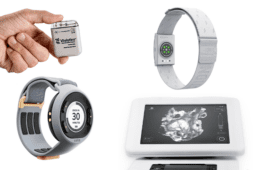A degenerative eye disease slowly robbed Roger Pontz of his vision.
Diagnosed with retinitis pigmentosa as a teenager, Pontz has been almost completely blind for years. Now, thanks to a high-tech procedure that involved the surgical implantation of a “bionic eye,” he’s regained enough of his eyesight to catch small glimpses of his wife, grandson and cat.
Photos of the Day: Restoring Sight in Michigan
“It’s awesome. It’s exciting — seeing something new every day,” Pontz said during a recent appointment at the University of Michigan Kellogg Eye Center. The 55-year-old former competitive weightlifter and factory worker is one of four people in the U.S. to receive an artificial retina since the Food and Drug Administration signed off on its use last year.
The facility in Ann Arbor has been the site of all four such surgeries since FDA approval. A fifth is scheduled for next month.
Retinitis pigmentosa is an inherited disease that causes slow but progressive vision loss due to a gradual loss of the light-sensitive retinal cells called rods and cones. Patients experience loss of side vision and night vision, then central vision, which can result in near blindness.
Not all of the 100,000 or so people in the U.S. with retinitis pigmentosa can benefit from the bionic eye. An estimated 10,000 have vision low enough, said Dr. Brian Mech, an executive with Second Sight Medical Products Inc., the Sylmar, Calif.-based company that makes the device. Of those, about 7,500 are eligible for the surgery.
The artificial implant in Pontz’s left eye is part of a system developed by Second Sight that includes a small video camera and transmitter housed in a pair of glasses.
Images from the camera are converted into a series of electrical pulses that are transmitted wirelessly to an array of electrodes on the surface of the retina. The pulses stimulate the retina’s remaining healthy cells, causing them to relay the signal to the optic nerve.
The visual information then moves to the brain, where it is translated into patterns of light that can be recognized and interpreted, allowing the patient to regain some visual function.
When wearing the glasses, which Pontz refers to as his “eyes,” he can identify and grab his cat and figure out that a flash of light is his grandson hightailing it to the kitchen.
The visual improvement is sometimes startling for Pontz and his wife, Terri, who is just as amazed at her husband’s progress as he is.
“I said something I never thought I’d say: ‘Stop staring at me while I’m eating,'” Terri Pontz said.
She drives her husband the nearly 200 miles from tiny Reed City, Mich., to Ann Arbor for check-ups and visits with occupational therapist Ashley Howson, who helps Roger Pontz reawaken his visual memory and learn techniques needed to make the most of his new vision.
At the recent visit, Howson handed Pontz white and black plates, instructed him to move them back and forth in front of light and dark backgrounds and asked that he determine their color.
Back home, Terri Pontz helps her husband practice the techniques he learns in Ann Arbor.
For them, the long hours on the road and the homework assignments are a blessing.
“What’s it worth to see again? It’s worth everything,” Terri Pontz said.
The artificial retina procedure has been performed several-dozen times over the past few years in Europe, and the expectation is that it will find similar success in the U.S., where the University of Michigan is one of 12 centers accepting consultations for patients.
Candidates for the retinal prosthesis must be 25 or older with end-stage retinitis pigmentosa that has progressed to the point of having “bare light” or no light perception in both eyes.
Dr. Thiran Jayasundera, one of two physicians who performed the 4.5-hour surgery on Roger Pontz, is scheduled to discuss his experiences with the retinal prosthesis process during a meeting of the American Society of Cataract and Refractive Surgery on Friday in Boston. He calls it a “game-changer.”
Pontz agrees: “I can walk through the house with ease. If that’s all I get out of this, it’d be great.”




